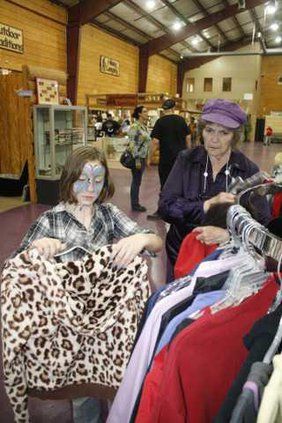Contact
For more information about Abba House or to volunteer, contact (678) 208-2000.
An area residential facility for women battling addiction and mental health issues recently moved its popular store into the former Outdoor Traditions building at Ga. 400 and Hwy. 136 in Dawsonville.
Abba House Inc. held a grand opening celebration on Saturday and Sunday to introduce the ministry to the community.
"Miracles happen here every day. That's one thing I want everyone to know about Abba House," said Heather James, a resident and mother of three young girls.
"Everyone could use Abba House. You don't have to be an alcoholic or an addict to come to Abba House. You just have to be broken and that's pretty much all of us."
Currently in its 13th year of operation in the area, Abba House has proved quite successful, with 93.8 percent of women avoiding a relapse and 100 percent remaining out of jail.
The 15-month program focuses on helping the women make life changes by overcoming the obstacles that brought them to Abba House. It was the sudden death of her husband that set James' downward spiral into alcohol abuse.
"He was kind of my moderator. We'd just drink beers together for fun and only us. Then when he died, I didn't have that accountability," she said. "Then I had an excuse to drink and everybody kind of validated it. I had three kids, 5 and under, to raise by myself and run a company by myself and do everything, and I was quickly overwhelmed with that and drank a lot."
Within months, the business was failing and her mother-in-law had filed suit for temporary custody of the girls.
Abba House became her refuge.
"It's a whole life change. It's not just about getting you sober. It's that alcohol is not the whole problem. It's everything else and the drinking is what you do for the problem," she said.
Today, James is one of 13 women living at Abba House and working at the new thrift store, as well as the ministry's first thrift store on Hwy. 9 in Silver City near the Dawson-Forsyth County line.
"We're from all walks of life, we cover the gamut age wise and we cover the gamut in addictions," she said. "We're all trying to find a balance and to be made whole."
Unique to Abba House is the component that allows the women's children to live with them, according to Jim Sharp, co-founder and executive director.
"That's extremely important, because if they come into this program, they've chosen men, they've chosen drugs, they've chosen all kinds of things over their children and they live with an enormous amount of shame and guilt," he said.
James understands that guilt.
"The first four months you're here, your kids can come visit, but they can't stay here with you," she said. "I went through a hard time here about a month after I started. I wanted to leave."
A conversation with God, she said, made her realize the alternative.
"I'd be dead, definitely, if I hadn't come to Abba House," James said. "Since I've been here, everything is different. There are five kids that live at Abba House now and I have three of the five."
James graduates in January but has chosen to continue with the subsequent nine-month program designed to help the women ease back into their new lives.
"I'm not planning to jump back in. I'm going to work here at Abba House and spend time with my kids," she said.
Sharp said everyone involved with Abba House is excited about the expansion of the new store and the potential exposure it could bring to the program.
"The women are trained as cashiers, trained to supervise departments at the store and near the end before they graduate, they are trained as assistant managers of the stores. The whole time we are pushing them to increase their abilities as leaders," he said.
By teaching work place skills, Abba House is providing those in their care a means to gain work experience and training.
"These are women who have lived on the margins of life that have been discarded, that have been abused and battered ... but at Abba House, there is hope. We show them there is hope," Sharp said.

